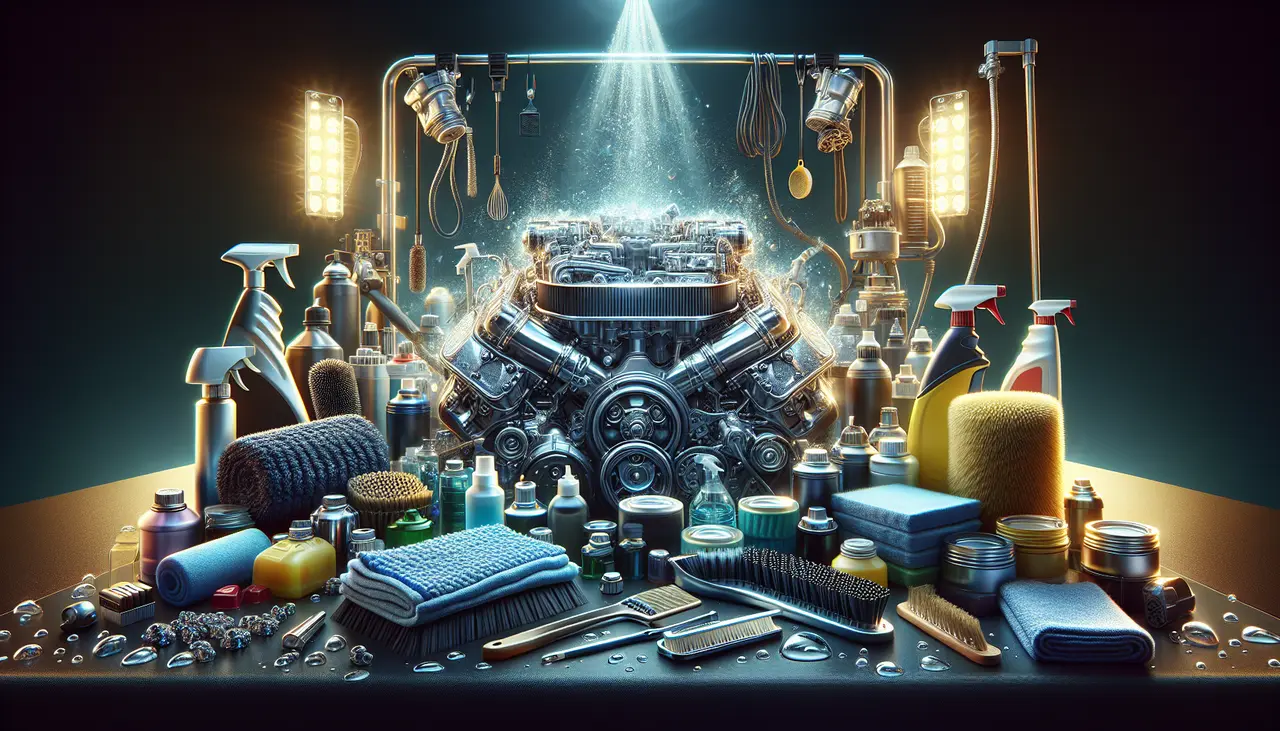Introduction to Engine Wash: Benefits for Your Car
Think of your car’s engine like the heart that pumps life into your vehicle. Just like how a healthy heart is essential for your well-being, a clean engine is crucial for your car’s optimum performance and longevity. An engine wash, while often overlooked, is a simple yet effective way to remove the dirt, grease, and grime that accumulates over time. This gunk, if left unchecked, can lead to overheating, reduced fuel efficiency, and in severe cases, engine failure. By keeping your engine clean, you not only ensure smoother runs but also protect crucial components, helping extend your car’s lifespan significantly. Moreover, a clean engine is easier to inspect and maintain, as potential issues can be spotted and resolved promptly. In a nutshell, investing in engine washes is investing in the health and durability of your car.
What is an Engine Wash?
An engine wash, simply put, is cleaning your car’s engine and its compartment. It’s not just about making it look good. Think of it like giving your car a bath, but instead of soap and water for the exterior, special cleaners are used to remove dirt, grease, and grime from the engine. Over time, engines get dirty from oil leaks, dust from the road, and debris. This mess can lead to your car running less efficiently. An engine wash helps in preventing this buildup, allowing your car to breathe better and run smoother. It can enhance performance, make your engine parts work less hard, which can also extend the life of your car. So, when we talk about an engine wash, we’re focusing on maintaining your car’s heart in top-notch condition to ensure it keeps running effectively. It’s one of those maintenance tasks that can really make a difference but is often overlooked.
Why Your Car’s Performance Benefits from an Engine Wash
An engine wash isn’t just about making your car’s heart look good; it’s crucial for its health and performance. Dirt, grime, and pollutants don’t just sit there; they actively harm your engine. They trap heat, causing your engine to run hotter than it should. Over time, this can lower your engine’s efficiency and make it work harder than necessary. In plain terms, a hotter engine equals more wear and tear, which equals more visits to the mechanic and money out of your pocket.
Now, when you opt for an engine wash, you’re allowing your car to breathe better. It’s like clearing your lungs so you can run a marathon instead of a sprint. This means improved fuel efficiency. You’ll notice your car runs smoother and responds better when you hit the gas pedal. It’s because all the parts can move freely without fighting through a layer of gunk.
Moreover, an engine wash can reveal potential issues hiding under the dirt that could turn into expensive repairs down the line. Finding a leak early can be the difference between a simple fix and a massive headache.
So, washing your engine isn’t just a cosmetic fix. It boosts your car’s performance, helps it run more efficiently, and can extend its life by preventing premature wear and tear. Think of it as a spa day for your car that it actually needs.
Extending Your Car’s Lifespan with Regular Engine Washes
A clean engine runs better, it’s that simple. Dirt and grime act like a sweater on your engine, making it hotter than it should be. Over time, this excess heat can wear down engine parts faster. By washing your engine regularly, you strip away this layer of dirt, helping it run cooler and more efficiently. This can lead to fewer breakdowns and a longer life for your car. Think of it as taking care of your car’s heart. Just like you wouldn’t want your arteries clogged, you don’t want your engine clogged with dirt. Plus, a clean engine is easier to work on and diagnose problems with, saving you time and money on future repairs. In short, regular engine washes keep your car running smoother for longer.
The Process: How is an Engine Wash Done?
First, the mechanic inspects your engine to identify any leaks or issues. It’s key because washing a leaky engine can lead to more problems. Once they give the all-clear, they’ll cover sensitive parts like the alternator, air intake, and electrical components with waterproof materials to protect them. Then comes the cleaning part. They’ll use a degreaser to cut through the grease and grime build-up. The degreaser sits for a bit to do its magic. After that, they’ll rinse the engine with low-pressure water to avoid any damage to sensitive parts. Some might use a steam cleaner for a deeper clean without much water. Once the engine is clean, they’ll remove the protective covers and dry off any visible water. In some cases, they might apply a dressing to the engine’s plastic and rubber parts to protect them and make them look good. This whole process not only makes your engine look pristine but also prevents corrosion, helping your car run better and last longer.
Engine Wash Types: Which One is Right for Your Car?
When it comes to keeping your car in top shape, an engine wash is a key step that’s often overlooked. There are mainly two types of engine washes – chemical and steam. Choosing the right one depends on your car’s needs and your personal preferences.
Chemical engine wash uses strong detergents to break down dirt, oil, and grime. It’s a deep clean option that gets into all the nooks and crannies. This type is great for cars that have a lot of buildup or haven’t been cleaned in a while. However, it’s important to ensure the chemicals won’t damage your engine’s sensitive parts.
Steam engine wash, on the other hand, uses high-pressure steam to clean the engine. It’s more eco-friendly and gentler than a chemical wash but might not be as effective on heavily soiled engines. Steam wash is perfect for regular maintenance and for those who prefer a more natural approach.
So, which one is right for your car? If your engine is particularly grimy or hasn’t been cleaned in ages, a chemical wash might be necessary to tackle all that buildup. For regular engine maintenance or a less intensive clean, a steam wash will do the job just fine. Remember, a clean engine runs more efficiently, stays cooler, and lasts longer. No matter which type you choose, an engine wash is a smart move for any car owner.
The Best Time to Get an Engine Wash
The best time to get an engine wash isn’t set in stone, but there are signs you should watch for and certain situations when it makes the most sense. After a long winter, consider an engine wash to clear out salt and grime build-up that can lead to corrosion. Before selling your car is another prime time; a clean engine can boost your car’s appeal to buyers. If you’re doing routine maintenance or notice your engine running hotter than usual, these are key times too. An engine wash can remove debris that affects its cooling. Aim for a wash when your car faces these conditions, rather than sticking to a strict schedule. This approach ensures your engine stays clean when it matters most, without unnecessary washes.
DIY Engine Wash Tips and Tricks
Before you dive into cleaning your car’s engine at home, make sure you’ve got all the necessary gear. You’ll need a degreaser, plastic bags, tape, a brush, and maybe a power washer if you’ve got one. Start by warming up your engine for a few minutes. Not too hot, just enough to help loosen the grime. Next up, turn off the engine and shield electrical components with plastic bags and tape. This step is crucial because water and electrics are a bad mix. Apply the degreaser from top to bottom, covering all areas but avoiding any exposed wiring or the alternator. Let the degreaser sit for about 15 minutes, then scrub tough spots with your brush. Now, if you’re using a power washer, set it on a light spray setting. Too much pressure can harm your engine. Rinse off the degreaser, gently, from back to front, ensuring all soap is gone. If you’re going old school without a power washer, a garden hose will do the trick, just keep that water pressure low. Once everything’s washed, remove the plastic bags and let your engine dry. You can use compressed air or a leaf blower to speed up this process. A clean engine runs cooler and could help spot leaks earlier because the grime’s gone. Remember, doing this at home can save you cash and keep your ride running smoothly. Just follow these steps, and you’ll be sorted.
Professional Engine Wash Services: What to Expect
When you take your car for a professional engine wash, expect experts to handle your ride with care. They start by covering sensitive areas, like electrical parts, to keep them dry. Then, they use specialized cleaners to cut through the grime and grease. After applying the cleaner, they meticulously rinse the engine bay, ensuring no cleaner residue harms your engine. High-pressure air might be used to dry off the water, followed by a protective coating applied to guard against future dirt and make the next cleaning easier. The entire process boosts your car’s performance by letting it breathe easier and run cooler. Always choose a reputable service to ensure your engine’s safety and to get the most bang for your buck.
Conclusion: The Overall Impact of Engine Wash on Car Health
An engine wash isn’t just about making your engine look good; it’s about keeping your car running smoothly and extending its life. Dirt, grease, and grime can build up over time, leading to overheating and reduced efficiency. By cleaning out this buildup, an engine wash helps maintain optimal operating temperatures and prevents wear and tear on engine components. This means your car performs better and might even save you money on fuel and costly repairs down the line. In short, the impact of a regular engine wash on your car’s health is significant. It’s a simple step you can take to ensure your vehicle remains in top condition, making it a wise investment for any car owner.









Leave A Comment